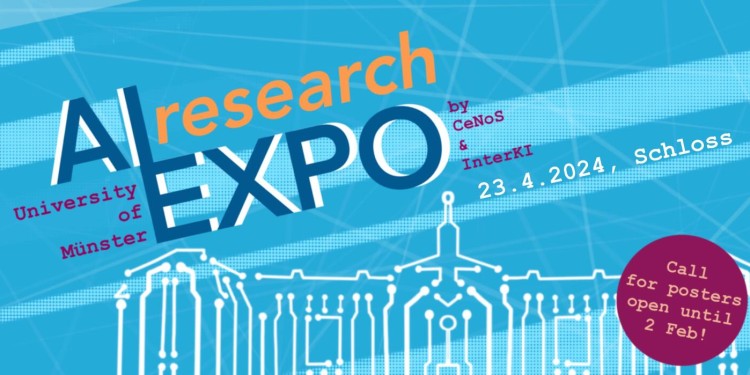
“AI has become established all over the University”
The Center for Nonlinear Science (CeNoS) at the University of Münster is inviting anyone interested to the “AI Research EXPO” event as part of the interdisciplinary “InterKI” (KI = AI) teaching programme. The aim of this event is to reflect the entire breadth of research into artificial intelligence (AI) at the University of Münster. Christina Hoppenbrock spoke to Dr. Katrin Schmietendorf from CeNoS, who is the coordinator of the teaching programme, about AI in research and teaching and about the EXPO on April 23.
What is artificial intelligence currently capable of in the field of research?
AI enables structures in large data volumes to be recognised, hypotheses to be postulated, experiments to be optimised and research questions to be tackled which couldn’t be handled – or only with great difficulty – using traditional methods. There are also other parts of scientific processes where researchers can get support from artificial intelligence – for example, in data acquisition, programming, literature research and in the writing process. In short, AI can speed up and even stimulate research in many academic fields.
Is there a certain atmosphere similar to a gold rush in the academic world?
The new possibilities naturally lead to a certain euphoria – sometimes entirely justifiably so. However, the low threshold of the availability of AI methods, coupled with careless usage, can lead to problems and false expectations. In the past, for example, again and again there were results which turned out to be non-reproducible. In science, that’s a serious problem. Also, pattern recognition merely reveals correlations and supplies no causal connections or theory-based explanations such as are the ‘gold standard’ in many disciplines. And, apart from all that, researchers have to deal with the danger of biases, i.e. systematic distortions, and with the black-box character of some algorithms.
Does AI have a role to play in teaching?
Yes, and an increasingly important one. Because AI competences are in ever greater demand in university research, just as in the jobs market, they’re increasingly to be found in teaching contents outside the ‘classic’ AI disciplines. This means that, especially in the teaching of basics, it pays to offer interdisciplinary teaching – as we do in our InterKI teaching programme. Another current development is the effort being undertaken under the heading ‘Learning Analytics’ to optimise learning processes and courses of study with the aid of AI. At the EXPO we will also be presenting a section entitled ‘AI in Higher Education Teaching’.
What else will the ‘AI Research EXPO’ be offering?
The response to our call for posters showed that AI is becoming established all over the University of Münster as an object and a tool for research, and that this development goes way beyond the STEM disciplines. What we want to do with the ‘AI Research EXPO’ is offer researchers a university-wide forum in which they can have discussions of an interdisciplinary nature and sound out synergy potentials. Afterwards, we will be transferring the ‘Book of Abstracts’ from EXPO to an AI map of the University of Münster. This map will serve to provide an overview of the AI activities here and will be accessible via the InterKI website.
Save the date:
“Late bird” registrations for the scientific programme of the “AI Research EXPO” (April 23) can be made up to April 14, at https://indico.uni-muenster.de/e/aiexpo2024
In addition to the scientific programme, there will be a talk, open to the public, held at 17:00 hours on April 23 in the auditorium (Aula) of the Schloss. Prof. Jan Cornelius Schmidt from the University of Darmstadt will be talking on the subject of “Change and Continuity in Science through AI – On the Current Changes in our Understanding of Science and Technology”. No registration will be necessary.
This article appeared in the University newspaper wissen|leben No. 2, 4 April 2024.
Further information
- Event information of the CeNoS
- Interdisciplinary Teaching Program on Machine Learning and Artificial Intelligence at Münster University, InterKI
- "Late Bird" registration until 14 April for the "AI Research EXPO"
- The April issue of the university newspaper wissen|leben as PDF [de]
- All issues of the Unizeitung at a glance
